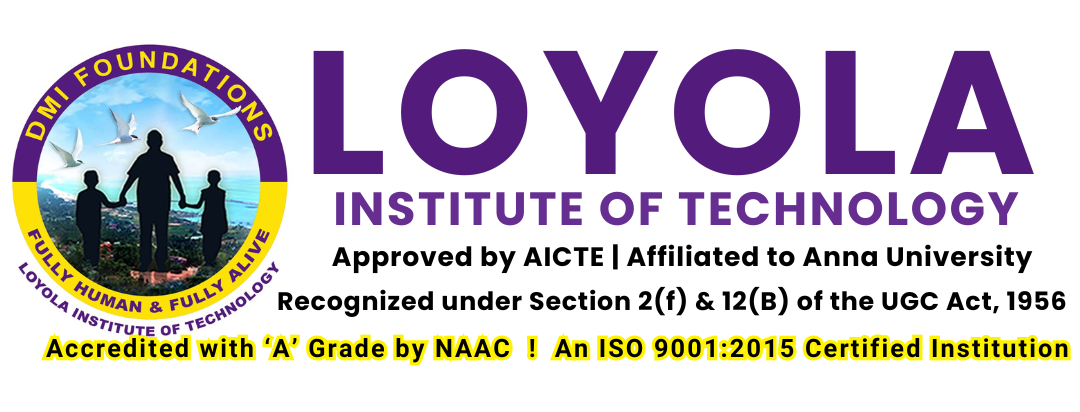B.E - Computer Science and Engineering
Vision
To be a centre of excellence in providing global standard education through contemporary and rigorous educational experience in the field of Computer Science and Engineering that facilitates our students to be competent in technology and responsible professional to serve the society with ethics.
Mission
We at the department of Computer Science and Engineering will strive to:
- Provide quality education in the field of Computer Science and Engineering that enables our students to excel in technical education.
- Promote self learning to incorporate new ideas and technologies in Computer Science and Engineering.
- Integrate research, academics, business practices and innovative solutions for students to face global challenges and to promote entrepreneurship for nation building.
- Provide an environment that enables our students to be ethically strong to serve the society.
Faculties
Program Educational Objectives (PEOs)
The Graduates will
After successful completion of the program, the graduates will be able to:
PEO 1: Apply the fundamental knowledge of Computer Science and Engineering to analyze and synthesize the information to arrive optimal solutions for the defined problems.
PEO 2: Manifest technical and intellectual sustainability in professionally competent environments or will become entrepreneurs.
PEO 3: Pursue higher education or engross them in Research and Development establishments to meet the societal needs.
PEO 4: Exhibit ethical and moral values to work in multidisciplinary environment and provide solutions to real time problems.
Program Specific Outcomes (PSOs)
- PSO 1: Understand the requirements, identify the appropriate/emerging technologies and domains with respect to Computer Science & Engineering to get the appropriate/suitable solutions.
- PSO 2: Identify the challenges in computation and networking domains and provide optimal/innovative solutions using appropriate technologies.
- PSO 3: Use the technical knowledge to establish new startups to build products and provide web services.
Short-Term Goals
- Modernizing the teaching and learning methodologies.
- Increasing successful completion of graduation.
- Organizing / participate more number of FDP’s both in-house and external.
- Improving the Institute – Industry collaboration, teamwork, peer mentoring, and social activities.
- Improving the placement ratio by conducting various soft skills & Placement Training programs.
- Encouraging the students to publish papers in Reputed Journals.
- Motivating the student to develop projects for the society.
Long-Term Goals
- To provide global standard education to our students.
- To be a responsible professional to serve the society with ethics.
Program Outcomes (POs)
Engineering Graduates will be able to:
- PO1: Engineering knowledge: Apply the knowledge of mathematics, science, engineering fundamentals, and an engineering specialization to the solution of complex engineering problems.
- PO2: Problem analysis: Identify, formulate, review research literature, and analyze complex engineering problems reaching substantiated conclusions using first principles of mathematics, natural sciences, and engineering sciences.
- PO3: Design/development of solutions: Design solutions for complex engineering problems and design system components or processes that meet the specified needs with appropriate consideration for the public health and safety, and the cultural, societal, and environmental considerations.
- PO4: Conduct investigations of complex problems: Use research-based knowledge and research methods including design of experiments, analysis and interpretation of data, and synthesis of the information to provide valid conclusions.
- PO5: Modern tool usage: Create, select, and apply appropriate techniques, resources, and modern engineering and IT tools including prediction and modeling to complex engineering activities with an understanding of the limitations.
- PO6: The engineer and society: Apply reasoning informed by the contextual knowledge to assess societal, health, safety, legal and cultural issues and the consequent responsibilities relevant to the professional engineering practice.
- PO7: Environment and sustainability: Understand the impact of the professional engineering solutions in societal and environmental contexts, and demonstrate the knowledge of, and need for sustainable development.
- PO8: Ethics: Apply ethical principles and commit to professional ethics and responsibilities and norms of the engineering practice.
- PO9: Individual and team work: Function effectively as an individual, and as a member or leader in diverse teams, and in multidisciplinary settings.
- PO10: Communication: Communicate effectively on complex engineering activities with the engineering community and with society at large, such as, being able to comprehend and write effective reports and design documentation, make effective presentations, and give and receive clear instructions.
- PO11: Project management and finance: Demonstrate knowledge and understanding of the engineering and management principles and apply these to one’s own work, as a member and leader in a team, to manage projects and in multidisciplinary environments.
- PO12: Life-long learning: Recognize the need for, and have the preparation and ability to engage in independent and life-long learning in the broadest context of technological change.
Course Outcomes (COs)
- Regulation 2017 – Click Here to View
- Regulation 2021 – Click Here to View
Syllabus
- Regulation 2013 – Click Here to View
- Regulation 2017 – Click Here to View
Study Materials
- Click Here to Download


